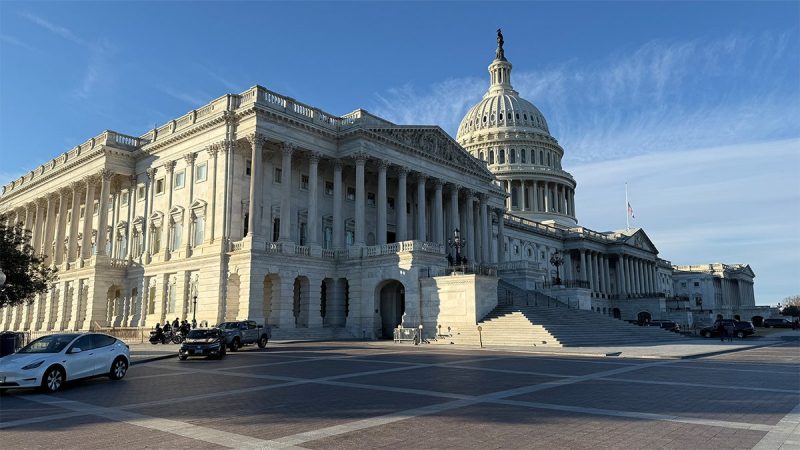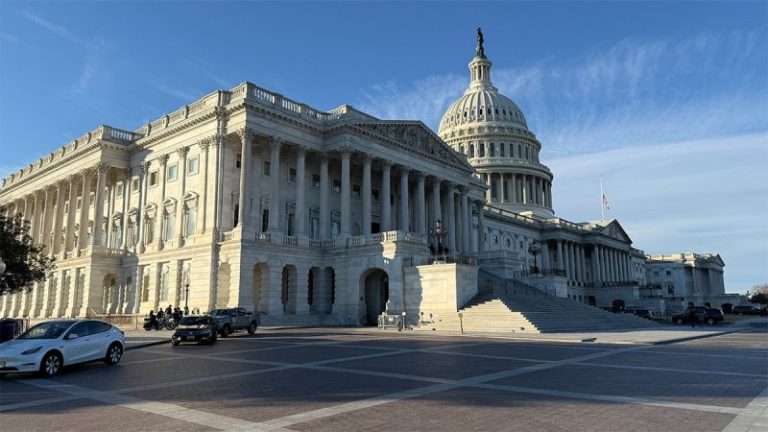
Emboldened congressional Democrats are expanding their battleground map for this year’s midterm elections, when Republicans will be defending their razor-thin majority in the House.
But the National Republican Congressional Committee (NRCC) chairman, Rep. Richard Hudson, isn’t buying it.
‘I mean, I’ve read fiction my whole life, and I recognize it when I see it,’ Hudson said in an exclusive with Fox News.
Republicans currently control the House 218-214, with two right-tilting districts and one left-leaning seat currently vacant. Democrats need a net gain of just three seats in the midterms to win back the majority for the first time in four years.
The Democratic Congressional Campaign Committee (DCCC) this week added five more offensive opportunities in Colorado, Minnesota, Montana, South Carolina and Virginia to their list of what they consider are vulnerable Republican-held House districts.
That brings the total number of districts Democrats are hoping to flip to 44. The DCCC notes that all five of the new districts they’re adding to their list of ‘offensive targets’ were carried by President Donald Trump by 13 points or fewer in the 2024 elections.
‘Democrats are on offense, and our map reflects the fact that everyday Americans are tired of Republicans’ broken promises and ready for change in Congress,’ DCCC Chair Suzan DelBene emphasized earlier this week.
And DCCC Spokesperson Viet Shelton told Fox News Digital, ‘In a political environment where Democrats are overperforming by more than 17 points in congressional special elections, it’s pretty clear we’re poised to re-take the majority. Momentum and the American people are on our side while Republicans are running scared.’
Asked about the DCCC’s move, Hudson scoffed.
‘They’ve got to have a list they can present to their donors,’ he said as he pointed to the DCCC. ‘But it’s not realistic. I mean, if you look at the map, there are very few seats up for grabs, and the majority of those seats are held by Democrats, but they’re seats that Donald Trump has carried or came very close….if you look at the seats that we’ll be competing for this fall. They’re they’re all favoring Republicans.’
The House GOP campaign chair added, ‘If you look at the map, it’s a Republican map. We just got to go out and win those races.’
The move by the DCCC comes as Democrats are energized, despite the party’s polling woes. Democrats, thanks to their laser focus on affordability amid persistent inflation, scored decisive victories in the 2025 elections and have won or over performed in a slew of scheduled and special ballot box contests since Trump returned to the White House over a year ago.
Republicans, meanwhile, are facing traditional political headwinds in which the party in power in the nation’s capital normally suffers setbacks in the midterm elections. And the GOP is also dealing with Trump’s continued underwater approval ratings.
The latest national surveys, including the most recent Fox News poll, indicate the Democrats ahead of the Republicans by mid-single digits in the so-called generic ballot question, which asks respondents whether they’d back the Democratic or GOP candidate in their congressional district without offering specific candidate names.
Asked about the polls, Hudson said, ‘We almost never lead in the generic ballot. But a single digit generic ballot, we do very well.’
And the House GOP campaign chair added he remains ‘very bullish.’
Cost of living concerns helped boost Trump and Republicans to sweeping victories in 2024, but affordability and overall economic concerns may work against them this year.
While the latest AP/NORC national poll indicated the GOP with a slight advantage over Democrats on handling the economy, a bunch of surveys, including the latest Fox News poll, indicate many Americans feel things are worse off than they were a year ago and remain pessimistic about the economy.
But on Friday the latest government numbers indicated that inflation eased during January.
And Hudson says the economy is still a winning issue for Republicans.
Pointing to the numerous tax cuts kicking in this year in the GOP’s sweeping One Big Beautiful Bill Act, which Trump signed into law last summer, Hudson touted ‘we put policies in place that are going to bring prosperity to the American people, and they’re starting to feel it.’
‘And as we move into tax season…folks who work overtime, folks who work for tips, they’re going to see a lot more money in their pocket thanks to no tax on tips, no tax on overtime,’ he added.
The GOP is also dealing with a low propensity issue: MAGA voters who don’t always go to the polls when Trump’s name isn’t on the ballot.
‘Our voters tend to be more working-class voters, and you have to put in extra effort to get them to the polls,’ Hudson said. ‘We know that’s our challenge. President Trump knows that’s the challenge, and he’s committed to helping us.’
Pointing to the NRCC’s annual fundraising gala, which Trump will once again headline this year, Hudson said this dinner will be a great kickoff for this year. We raised a whole lot of money with President Trump last year. We plan to raise a lot of money in March with President Trump, and then he’s going to get out on the campaign trail and help us turn out those voters and make that case.’
Asked about midterm election predictions, Hudson shied away from giving any hard numbers.
‘Not going to give you a number, but we’re going to hold the majority,’ he predicted. ‘President Trump was elected with a very specific agenda. We delivered almost his entire domestic agenda, and we’re going to go back to the voters and say promises made, promises kept, and they’re going to keep this House majority.’





